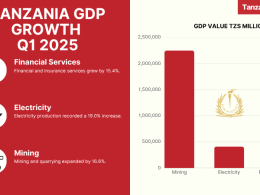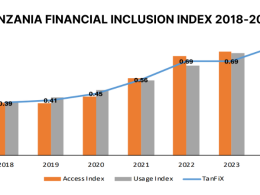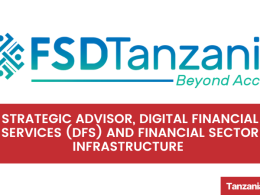TanzaniaInvest spoke with Mr. Davith Kahwa, Executive Director of Creditinfo Tanzania. TanzaniaInvest and Mr. Kahwa discussed Creditinfo’s role in Tanzania, credit information and lending, Credit Bureaus, Tanzania’s booming sectors, and Tanzania’s place in the world.
TanzaniaInvest.com: Creditinfo Tanzania is one of the global players in credit information to assist banks in making lending decisions. Why did you decide to enter Tanzania, and why now?
Davith Kahwa: Creditinfo’s core business is information in relation to credit, offering services to cover each stage of the customer life cycle. Our services help businesses evaluate prospective customers, monitor existing ones and manage the debts that they may have incurred. Basically, we collect data from as many sources as possible, process and provide it in a meaningful format to those people who have a rightful reason to use that data. We carry out these services in accordance with the relevant legal framework in each of the countries where we operate. Currently we operate in 14 countries globally.
Our entrance to Tanzania was response to supporting government initiatives to strengthen the country’s financial infrastructure, which is a key pillar to support economic and financial sector growth and stability, promote financial inclusion, and reduce the cost of borrowing to the consumer.{xtypo_quote_right}Our entrance to Tanzania was response to supporting government initiatives to strengthen the country’s financial infrastructure, which is a key pillar to support economic and financial sector growth and stability{/xtypo_quote_right}
DK: Without information on borrowers’ risk profiles, a lender may mistake good risks for bad ones and vice versa. For low-risk borrowers, credit is expensive relative to its uses; as they are called on to subsidize high-risk borrowers. For high-risk borrowers, credit is cheap, as it is conversely subsidized. Lower-risk borrowers are driven from the market and higher-risk ones are brought in by cheap credit. Interest rates adjust to reflect more risky loan portfolios leading to higher rates. Higher rates also create incentives to take on riskier projects, as less risky projects will not yield the return to compensate for the costs of the loan. Risky projects come to account for a larger share of the portfolio, thereby driving up the average rate.
When information is shared, lenders are able to better discern an individual’s risk profile, and by being able to screen away more risky borrowers, they can improve the performance of the portfolio and extend lower rates to less risky borrowers who would not have borrowed otherwise. Moreover, with more accurate discernment, lenders are able to price loans more at the individuals risk profile and less so at the portfolio average, thereby gaining market share.
TI: Your goal is to aggregate this information; so how do you convince banks and other institutions to share this information with you?
DK: Financial education and awareness pertaining to credit information sharing is an important component of the bigger initiative driven by the Bank of Tanzania of which credit bureaus is one of key stakeholders. This is ongoing activity to ensure credit market players, consumers and other public and private institutions understand the benefits of credit information sharing. Furthermore, banks and other credit providers are mandated by the law to comply with the principle of reprocity: a member has to share data in order to able to receive data.
TI: What feedback are you receiving from the Banking Community so far?
DK: We have been in operation since June 2013, and the feedback from our customers has been excellent. We have had testimonies from clients who have integrated our system to their credit assessment processes saying that our system have transformed and enhanced their credit risk management processes. We are providing an extra dimension to their credit assessment process, details that previously the banks may have been unaware of.
TI: There are two Credit Bureaus today in Tanzania. Is the market big enough for both? What makes one Credit Bureau different from another?
DK: It is good there is more than one credit bureau because competition is good for us and our customers. We will be challenged by our competitor to perform better this will have positive impact to our business and consequently our customers. On the other hand, the customers will have the opportunity to validate the value proposition of each provider and make an informed decision.{xtypo_quote_left}We have had testimonies from clients who have integrated our system to their credit assessment processes saying that our system have transformed and enhanced their credit risk management processes.{/xtypo_quote_left}Of course for all of us our core product is a credit report, but they will be key differentiator such as value added services such as advanced credit rating / score, identity verification (fraud prevention and detection), reports on industry and geographic areas and most important listening to our customers individually and addressing their unique requirements.
TI: The Tanzanian economy is vibrant. Where do you see the most interesting investment opportunities in here?
DK: It’s no secret that Oil and Gas is the talk of the day. It is a sector that shows significant potential for growth, and activities surrounding Oil and Gas need financing. The financial service industry will also benefit significantly from this new economic sector
Commercial farming and agro-processing is another sector with significant potential that has not been showcased properly. To harness all these potential we will need to enhance our governance processes for the benefits of all Tanzanians. Creditinfo will be at the centre of this as the economy expands in these and all economic sectors.{xtypo_quote_right}It is no surprise that so far in 2013, Tanzania has had visits from the leaders of the two great economic powerhouse in the world USA and China. The world can see opportunities available in Tanzania today.{/xtypo_quote_right}
TI: If you had to explain to foreign investors what Tanzania is all about, what would you say?
DK: Tanzania is in such a unique position at this point in time; there is a lot of potential that has not yet been explored. We have an up and coming Oil and Gas economy; we have been endowed with natural resources that have led to successes in tourism; we have been endowed with arable land that is available for commercial farming, more to be done as far as infrastructure development is concerned.We have a stable and dynamic government encouraging investments and creating environment for growth. It is no surprise that so far in 2013, Tanzania has had visits from the leaders of the two great economic powerhouse in the world USA and China. The world can see opportunities available in Tanzania today.









